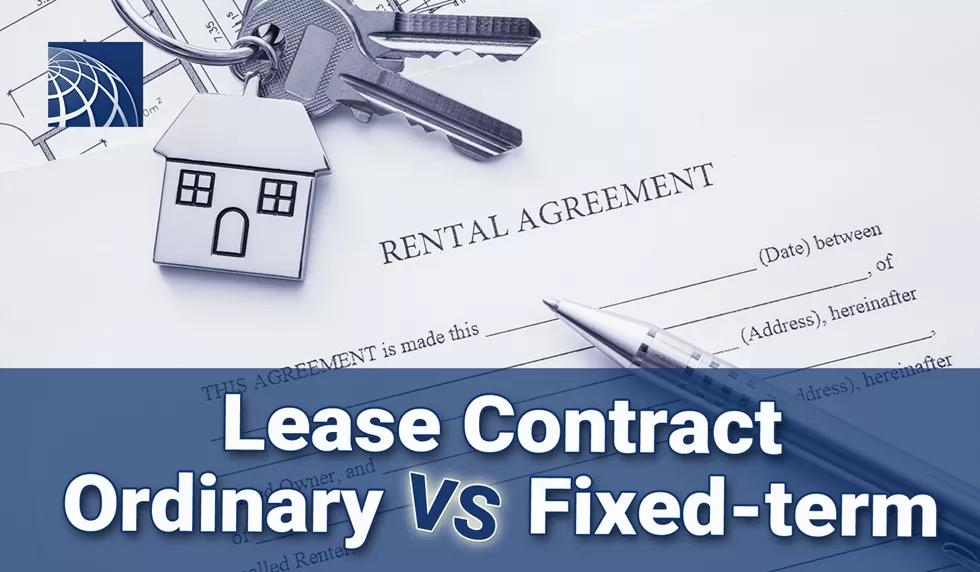Ordinary Lease Contract vs. Fixed-term Lease Contract

When renting out a real estate property to a lessee or renting from a lessor, you have the choice using either an “Ordinary Lease Contract” or a “Fixed-term Lease Contract” when making a contract. The “Act on Land and Building Leases” provides guidelines for midterm cancellations and contract renewals.
Here is an explanation about the differences of each contract type, their uses, and the advantages and disadvantages of each.
Ordinary Lease Contract

This is a traditional month-to-month automatically renewing lease contract.
| Method of Contract | Either made orally or in writing. A real estate company will draft the necessary document related to the type of lease (renting/renting out). |
|---|---|
| Term of Contract | The term for the contract is generally for a minimum period of 2 years. A contract for a period of less than 1 year period is not valid as the contract length is not explicitly specified in the contract. |
| Renewal of Contract | A lessor cannot refuse the renewal of contract without valid reasons. |
| Midterm cancellation | Canceling a contract before its term is over requires 6 months prior notice from the Lessor or 1–2 months prior notice from the Lessee. Cancelation by Lessor shall also require valid reasons. |
| Revision of Rent | Even in the event that both parties use a special contract, the contracting parties can demand the increase or decrease of the rent price. |
Advantages of using an Ordinary Lease Contract
- ・It is easy to attract tenant with this type of contract.
- ・Rent can be set higher than when using a Fixed-term Lease Contract.
Disadvantages of using an Ordinary Lease Contract
- ・For a Lessor who wants to rent out their property temporarily, there is a risk that lessee will not vacate the property once their contract term is up.
- ・In many cases it is difficult for a Lessor to cancel the contract, even with a lessee with whom they have many problems.
Ordinary Lease Contracts tend to lean more towards favoring the Lessee–for protection purposes–as well as offering less disadvantages for the Lessee. As a result of the protection afforded to the Lessee, there are many disadvantages for the Lessor. Such disadvantages include but are not limited to:
- ・Difficulty for a Lessor to request that a Lessee vacate a leased property. This is due to the requirement of having a valid reason for a Lessor’s refusal for a contract extension or for a midterm cancellation of the contract.
- ・Midterm cancellation of a contract without a valid reason is near impossible for a Lessor. Even if the Lessor needs to use the leased property for oneself for any reason or the Lessor needs to reconstruct a the decrepit property the have rented out to the Lessee.
When a Lessee refuses vacate a property–even in the aforementioned cases–the Lessor may be required to pay the Lessee a compensation fee for the eviction.
Fixed-term Lease Contract

The “Act on Land and Building Leases” was revised in accordance with the “Act on Special measures concerning the promotion of supply of high quality lease houses, etc.” and came into effect on March 1st, 2000.
| Method of Contract | A written contract is required. An oral contract will usually be handled as an Ordinary Lease Contract. The Lessor is obligated to notify the Lessee in writing that the contract is a fixed-term contract, without extension and will be terminated at the contract’s expiration date. |
|---|---|
| Term of Contract | There is no limit to the length of the contract period. As there are no limits on the period length, it is possible for the contract to end earlier than a year or last as many years as the Lessor and Lessee agree upon. |
| Renewal of Contract | A fixed-term contract does not include contract renewal. The contract is terminated at the specified expiration date. However, extensions and re-contracting is possible when both parties of the contract agree to do so. |
| Notice of Contract Termination | When the term of the contract is for more than 1 year, the Lessor must notify the Lessee of the contracts upcoming termination 6 months to a year prior to its expiration date. When the Lessor fails to notify the Lessee, the contract’s expiration date will be extended 6 months from the date of notification. |
| Midterm cancellation | In the case of buildings with a gross floor area of less than 200m2 or residential buildings, a Lessee is allowed to cancel their rental contract before the expiration date. However, this is only allowed if Lessee has some unavoidable reason (such as job transfer, medical treatment, having to care for a relative). For this type of cancelation the Lessee must give the Lessor at least a 1 month advance notice (Article 38, Section 5 of Act on Land and Building Leases). As this situation is covered by the law, a midterm cancellation in this case is possible without needing any special contract. Other cases of midterm cancellation must be in accordance with a special contract. Unless otherwise stated in the contract, a Lessor is will not be permitted to cancel their contract before its expiration date. |
| Revision of Rent | Since both contract parties can act upon their Right to Request and Increase or Decrease in Rent, a special contract clause about revision of rent may be established in a lease contract. The special contract clause based on the both parties’ agreement shall be given priority and have its effect explicitly stated in the clause in principle. |
Advantage of Fixed-term Lease Contract
- ・The period of the contract can be decided freely.
- ・Aged deterioration can be repaired earlier by shortening the term of the contract.
- ・A Lessor can easily refuse to recontract with a bad Lessee who in breach of contract or arrear of rent.
Recontracting is possible when the both parties wish to do so.
Renting out a property for a fixed period of time without any problems is possible in event that a “Lessor wants to use a leased property for oneself after renting it out for a certain period of time” or a “Lessor wants to demolish a property and sell the vacant land”.
When reconstruction is necessary–due to aged deterioration–a plan for reconstruction will be able to proceed as scheduled by setting the term of a contract to meet the timing of the planned reconstruction.
For a tenant occupying a property for a fixed period of time, such those attending school or business transfers, there are no concerns about being able to renew a contract as it was decided in advance that the contract would expire and the tenant would move out.
Disadvantages of a Fixed-term Lease Contract
A disadvantage for a Lessor is that it is not easy to find a tenant willing to use a fixed-term lease contract without offering a discount on the price of rent. As a Lessee you may have worry about possibility of not being able to recontract your tenancy even you would like to continue living at said property. Establishing a special contract clause within the contract stating that “recontracting is possible when both parties agree to do so” may lessen anxiety of a Lessee. If it has been explicitly stated in the contract, a Lessee can recontract as long as they are not in breach of contract or arrear of rent. However, if the Lessee is in breach of contract or arrear of rent the Lessor can refuse to recontract.
Summary
While they may not seem so different an Ordinary Lease Contract and a Fixed-term Lease Contract do in fact have various differences.
It is important to choose whether an Ordinary Lease Contract or a Fixed-term Lease Contract is right for you based on your situation as both have their advantages and disadvantages. A simple way to compare them is by understanding that an Ordinary Lease Contract lets the Lessee decide whether or not to renew a contract at its termination date, while a Fixed-term Lease Contract enables a Lessor more control over renewability of the contract and its length.

- Rental Apartments & Houses in Tokyo
- Listings of popular and luxurious rental apartments, condominiums, and houses designed with expats in mind.

- Apartments & Houses for Sale in Tokyo
- Listings of apartments, condominiums, and houses available for purchase in Tokyo.





















